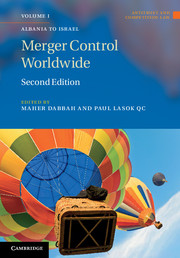Book contents
- Frontmatter
- Contents
- Preface
- List of Contributors
- Table of cases
- Table of Legislation and Official Guidance
- Introduction
- Albania
- Argentina
- Armenia (Republic of Armenia)
- Australia
- Austria
- Barbados
- Belgium
- Bosnia and Herzegovina
- Brazil
- Bulgaria (Republic of Bulgaria)
- Canada
- Chile
- China*
- Costa Rica
- Croatia
- Cyprus (Republic of Cyprus)
- Czech Republic
- Denmark
- Estonia
- European Economic Area
- European Union
- Finland
- France
- Germany (Federal Republic of Germany)
- Greece
- Hong Kong
- Hungary
- Iceland
- India
- Indonesia (Republic of Indonesia)
- Ireland
- Israel
- Italy
- Japan
- Kenya
- Korea
- Latvia
- Lithuania
- Macedonia (Republic of Macedonia)
- Malta
- Mexico
- Netherlands (The Netherlands)
- New Zealand
- Norway
- Pakistan
- Peru
- Philippines (Republic of the Philippines)
- Poland
- Portugal
- Romania
- Russia
- Serbia
- Singapore
- Slovakia (Slovak Republic)
- Slovenia
- South Africa
- Spain
- Sri Lanka
- Sweden
- Switzerland
- Taiwan
- Thailand
- Tunisia (Republic of Tunisia)
- Turkey
- Ukraine
- United Kingdom
- United States of America
- Uzbekistan
- Venezuela
- Zambia
- Index
United Kingdom
Published online by Cambridge University Press: 05 November 2014
- Frontmatter
- Contents
- Preface
- List of Contributors
- Table of cases
- Table of Legislation and Official Guidance
- Introduction
- Albania
- Argentina
- Armenia (Republic of Armenia)
- Australia
- Austria
- Barbados
- Belgium
- Bosnia and Herzegovina
- Brazil
- Bulgaria (Republic of Bulgaria)
- Canada
- Chile
- China*
- Costa Rica
- Croatia
- Cyprus (Republic of Cyprus)
- Czech Republic
- Denmark
- Estonia
- European Economic Area
- European Union
- Finland
- France
- Germany (Federal Republic of Germany)
- Greece
- Hong Kong
- Hungary
- Iceland
- India
- Indonesia (Republic of Indonesia)
- Ireland
- Israel
- Italy
- Japan
- Kenya
- Korea
- Latvia
- Lithuania
- Macedonia (Republic of Macedonia)
- Malta
- Mexico
- Netherlands (The Netherlands)
- New Zealand
- Norway
- Pakistan
- Peru
- Philippines (Republic of the Philippines)
- Poland
- Portugal
- Romania
- Russia
- Serbia
- Singapore
- Slovakia (Slovak Republic)
- Slovenia
- South Africa
- Spain
- Sri Lanka
- Sweden
- Switzerland
- Taiwan
- Thailand
- Tunisia (Republic of Tunisia)
- Turkey
- Ukraine
- United Kingdom
- United States of America
- Uzbekistan
- Venezuela
- Zambia
- Index
Summary
Introduction
The July 2001 White Paper, ‘A World Class Competition Regime’, included proposals to modernise and strengthen the United Kingdom’s framework for merger control. The system for merger control had remained largely unchanged since its introduction in the Monopolies and Mergers Act 1965 and subsequent inclusion, with some amendments, in the Fair Trading Act 1973 (‘the FTA 1973’). Central to the proposals for reform was the aim of ‘taking mergers out of the political arena’. The proposals contained in the White Paper were subsequently enacted in Part 3 of the Enterprise Act 2002 (‘the 2002 Act’).
Before the 2002 Act, Part V of the FTA 1973 empowered the Secretary of State for Trade and Industry (‘the Secretary of State’) to refer to the Monopolies and Mergers Commission (MMC) for investigation, and to report a merger situation, or a potential merger situation, qualifying for investigation under that Act. The Director General of Fair Trading (‘the Director’) lay under a duty to make recommendations to the Secretary of State in that regard. If the Secretary of State made a merger reference, the MMC was required to investigate and report on the questions whether or not a qualifying merger situation had been created and, if so, whether or not the creation of that situation operated, or might be expected to operate, against the public interest. The ‘public interest’ was widely defined to include not only maintaining and promoting effective competition in the United Kingdom, but also various other matters. In the years leading up to the 2002 Act, however, most mergers under the FTA 1973 were examined exclusively on competition grounds. Where the MMC’s report identified effects adverse to the public interest, the Secretary of State was empowered to remedy those effects by statutory instrument. In so doing, the Secretary of State was required to take into account any recommendations made by the MMC and any advice given by the Director. The decision-making power in relation to a merger therefore lay with the Secretary of State, who exercised a discretionary power. The Secretary of State was assisted by advisory bodies (the MMC and the Director).
- Type
- Chapter
- Information
- Merger Control Worldwide , pp. 1446 - 1476Publisher: Cambridge University PressPrint publication year: 2012

